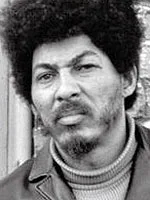 Donald Lee Cox , known as Field Marshal DC, was an early member of the leadership of the African American revolutionary leftist organization the Black Panther Party, joining the group in 1967 died he was , 74.. Cox was titled the Field Marshal of the group during the years he actively participated in its leadership, due to his familiarity with and writing about guns.
Donald Lee Cox , known as Field Marshal DC, was an early member of the leadership of the African American revolutionary leftist organization the Black Panther Party, joining the group in 1967 died he was , 74.. Cox was titled the Field Marshal of the group during the years he actively participated in its leadership, due to his familiarity with and writing about guns.(April 16, 1936 – February 19, 2011)
Biography
 After a rural upbringing in western Missouri, Cox moved to San Francisco in 1953 at age 17. He became interested in political action through following the desegregation and civil rights events of the next several years. Cox joined the Oakland, California-based Black Panthers in 1967 in response to a civilian-shooting-by-police incident in the Hunters Point section of San Francisco a year earlier.[2] Along with Eldridge Cleaver, Huey P. Newton and Bobby Seale and others, Cox was a member of the "central committee" of the Panthers.[1]
After a rural upbringing in western Missouri, Cox moved to San Francisco in 1953 at age 17. He became interested in political action through following the desegregation and civil rights events of the next several years. Cox joined the Oakland, California-based Black Panthers in 1967 in response to a civilian-shooting-by-police incident in the Hunters Point section of San Francisco a year earlier.[2] Along with Eldridge Cleaver, Huey P. Newton and Bobby Seale and others, Cox was a member of the "central committee" of the Panthers.[1]Cox became a national organizer and spokesperson for the group, which was involved in multiple legal cases and a target of the COINTELPRO project of the United States Federal Bureau of Investigation.[3] In January 1970, Cox was invited to speak to several dozen guests of composer Leonard Bernstein and his wife Felicia at their penthouse apartment in the wealthy Upper East Side neighborhood of Manhattan. The gathering was an effort to raise funds for the defense of twenty-one Black Panther members who were charged with conspiracy to bomb buildings and other crimes.[1][4] Cox was famously photographed along with the Bernsteins for a cover story essay by Tom Wolfe in New York magazine, published in June of 1970 and entitled "Radical Chic: That Party at Lenny's".[4] The article led to the popularization of "radical chic" as a critical term.[5] Cox, along with the Bernsteins, vehemently dismissed Wolfe's notion that the New York upper class was dabbling in radical politics as a fashion statement at the event, vouching for their sincerity.[1]
Shortly after the Bernstein fundraiser Cox was accused along with several others of conspiracy to murder a Panther who was an informant in Baltimore named Eugene Anderson. Cox fled the United States to avoid trial, living first in Algeria and later in the Languedoc-Roussillon region of southern France. Cox did not return to the United States, although he married an American from Philadelphia, Barbara Easley. He died in exile in Camps-sur-l'Agly, France in February 2011.[1]
To see more of who died in 2010 click here



No comments:
Post a Comment